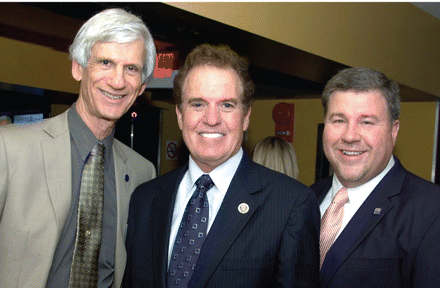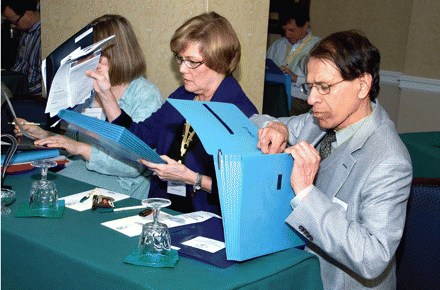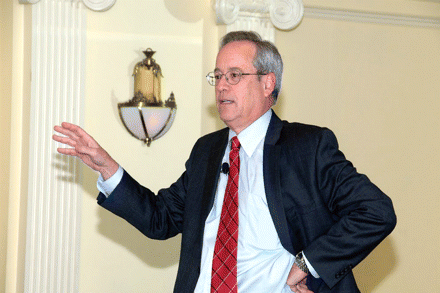Advocacy Day brought 70 psychiatrists last month from 42 states to Washington, D.C., to learn advocacy skills and the intricacies of policies and legislation about key mental health issues. Also part of the schedule were meetings with their congressional representatives and opportunities to interact with their fellow psychiatrists. Participants conducted almost 250 Capitol Hill visits in one day, covering nearly half of Congress's 535 members.
Breakout sessions for participants focused on topics such as mental health parity, Medicare scope of practice, posttraumatic stress disorder, public health funding, workforce issues, and Medicare physician payment (SGR formula). Attendees were also given talking-point handouts on several mental health policy topics, as well as a draft letter to Health and Human Services Secretary Kathleen Sebelius on implementation of the mental health parity law.
Matthew Sturm, an associate director in APA's Department of Government Relations, told Psychiatric News that the sessions and handouts served as good preparation for the APA members' Capitol Hill visits.
APA Area 5 Trustee Mary Helen Davis, M.D., served as a moderator for some of the breakout sessions, including ones devoted to the parity law and to accountable care organizations. Davis told Psychiatric News that "having been a participant in advocacy days over the past 15 years, I think that the current environment is the most exciting. We are in the midst of major health care transformation including changing policy in the mental health care arena. We have to build on the parity legislation, keep ourselves and our members knowledgeable of the changing face of health care delivery models, as well as advocate for our patients, ensuring that mental health needs are understood by the decision makers who will be developing health care policy over the next couple of decades." Davis added, "Although this is a time of great opportunity, there is also monumental uncertainty, with no guarantees of the success or failure of any of the new programs that are emerging."
An APA Advocacy Day evening reception provided the opportunity for continued interaction in a more relaxed setting. It was well attended by members of Congress, including Reps. Phil Gingrey (R-Ga.), Laura Richardson (D-Calif.), Jason Altmire (D-Pa.), and Loretta Sanchez (D-Calif.), as well as dozens of congressional staff.
Altmire told Psychiatric News, "I always value having the opportunity to talk to constituents about the topics they feel most strongly about. Hearing the insights and concerns of the American Psychiatric Association members will help me make more informed decisions on the issues affecting Americans who struggle with mental illness and those who treat them."
A sense of the magnitude of the possibilities for advances in health care policy and the need for vigilance in trying to shape policy was echoed by attendees. In a sort of running diary of Advocacy Day events for Psychiatric News, New Jersey psychiatrist Steve Resnick, M.D., noted that the current state of psychiatry and health care policy offers exciting opportunities for advances to occur, but there are also concerns stemming from budget cuts and threats to confidentiality.
Resnick said he was enthralled by the opportunity to talk with colleagues and then policymakers on the Hill about these issues. "As I listen to the state of affairs, there is a concern about the future, but also an excitement about the input I can personally have in shaping the future." He went on to say that the changes being made in health care policy are "a crucial turning point for medicine in general and psychiatry specifically, and we can have a great impact on the outcome of these changes."
In another Advocacy Day event, psychiatrist Don Harr, M.D., of Montana was presented with the Advocacy Leadership Award. Charles Price M.D., a member of APA's Council on Advocacy and Government Relations, cited Harr's more than 40 years of championing mental health causes to the Montana legislature. In speaking with Psychiatric News, Harr said his hope for the award is that "to those in attendance it will be some added incentive to stay with the advocacy program and develop it to be even more successful than it already is."
Two keynote speakers addressed Advocacy Day participants. Stuart Rothenberg, editor and publisher of the Rothenberg Political Report and columnist for Roll Call, kicked off the event, offering colorful commentary on the current state of U.S. politics. Rothenberg talked electoral politics and the impossibility of knowing what is in store for the next election cycle. He praised APA for its efforts at shaping policy through an event such as Advocacy Day.
Rep. Bill Cassidy (R-La.) opened day two, stressing to attendees the importance of physicians being advocates. Cassidy is a physician and an associate professor of medicine at Louisiana State University and wanted the audience to know that he considers himself a doctor first and a politician much further down the list of descriptors he would apply to himself. He said that doctors need to remember that they cannot afford to think that politics is beneath them. If doctors don't advocate on behalf of health care and patients, the results may be a system that fails to represent these interests.
In a statement to Psychiatric News, Cassidy's office summed up Advocacy Day, saying that "Congressman Cassidy was honored to address the American Psychiatric Association Advocacy Day. As a physician himself, Dr. Cassidy truly understands the vital importance of APA and greatly appreciates its advocacy work. Dr. Cassidy was excited to discuss the importance of physician political action. It is critical that physicians' values have a voice in the political process; their values are not the values of lawyers or business interests—they are unique and need to be represented. If not, a vacuum will be created, which will be filled with voices not focused on patient care."




